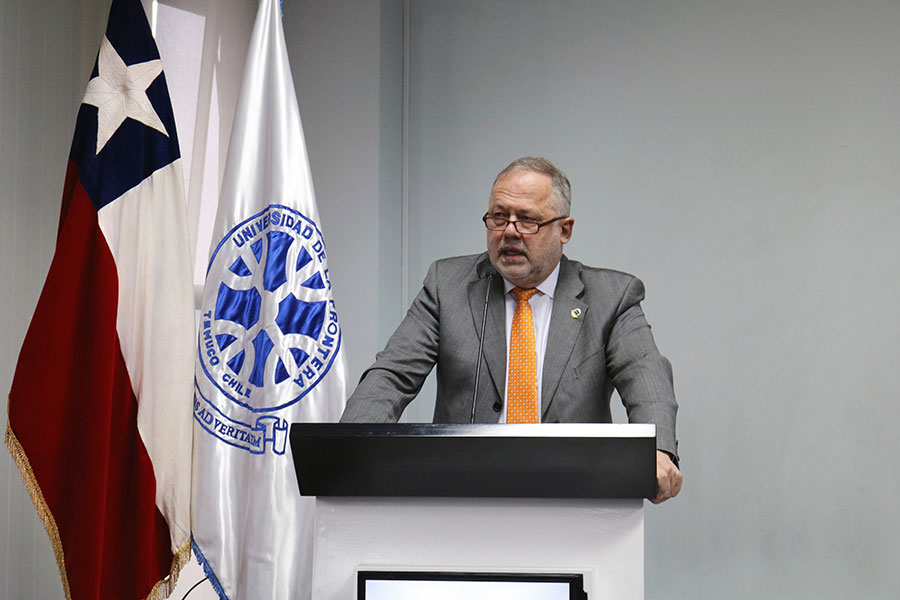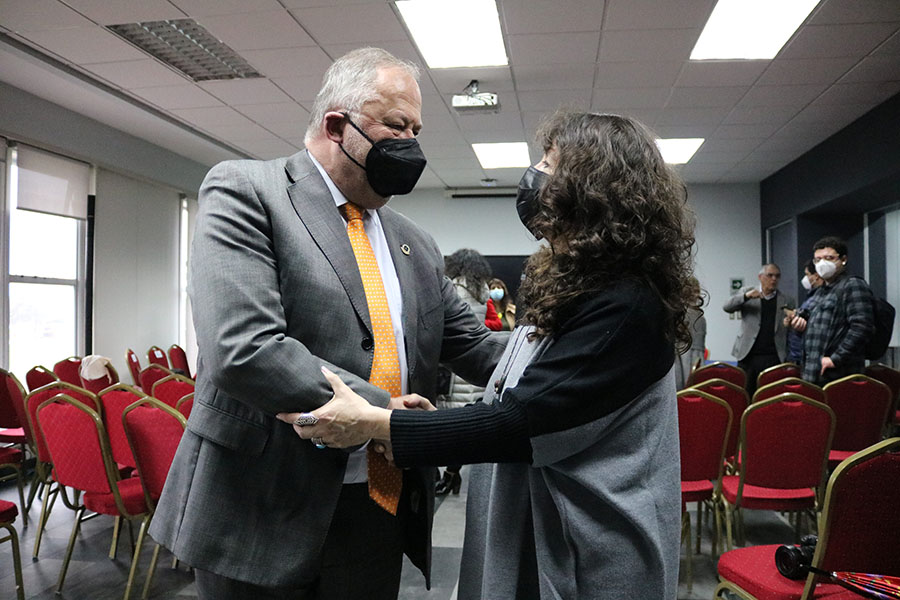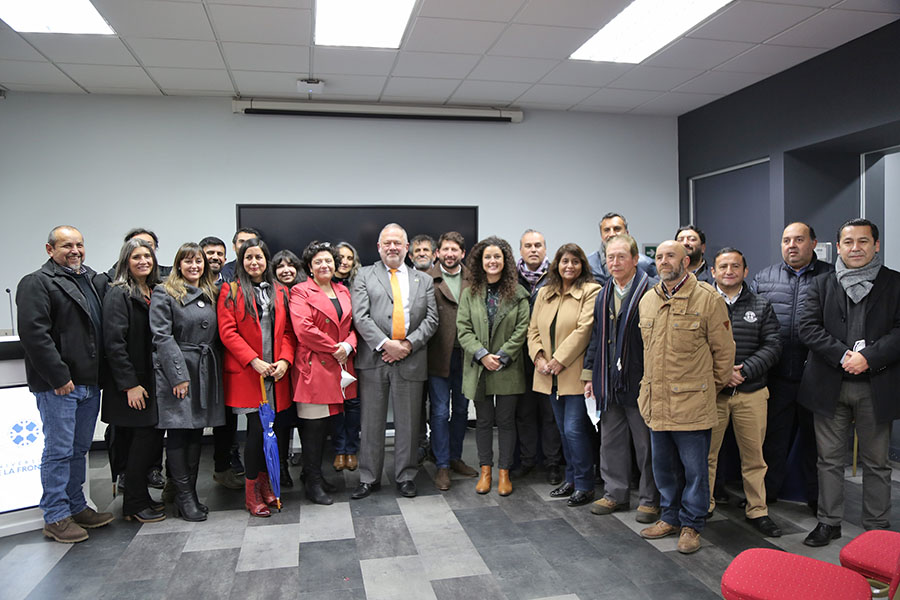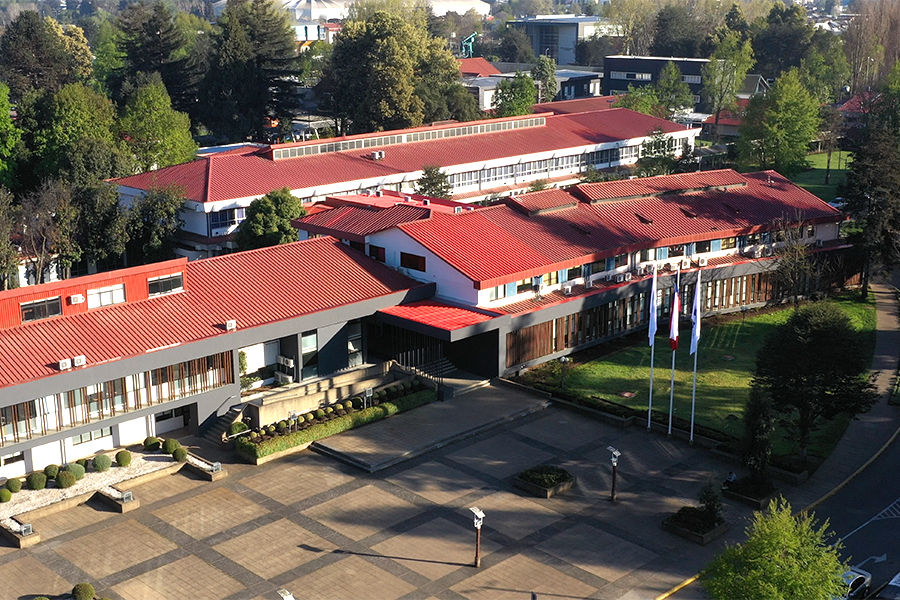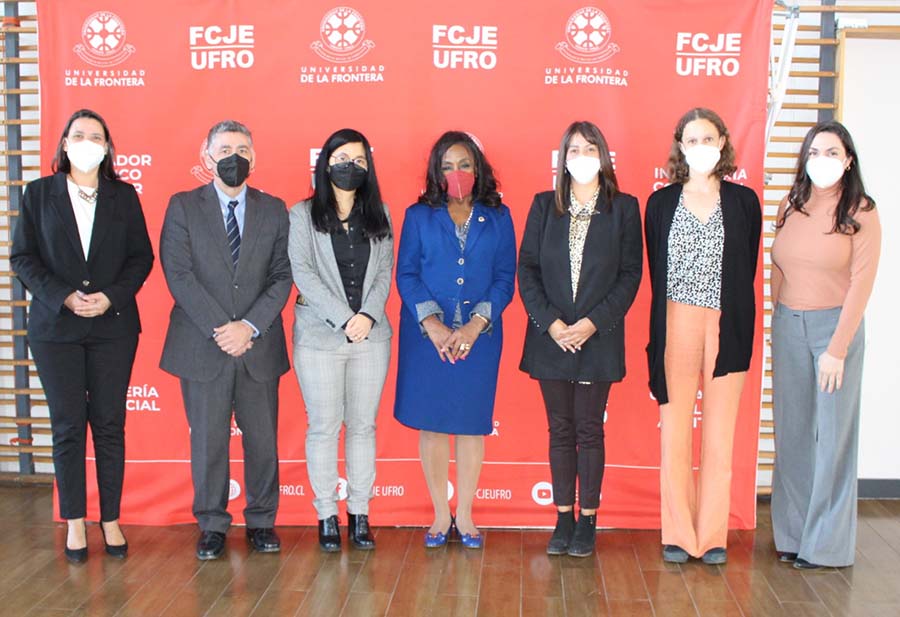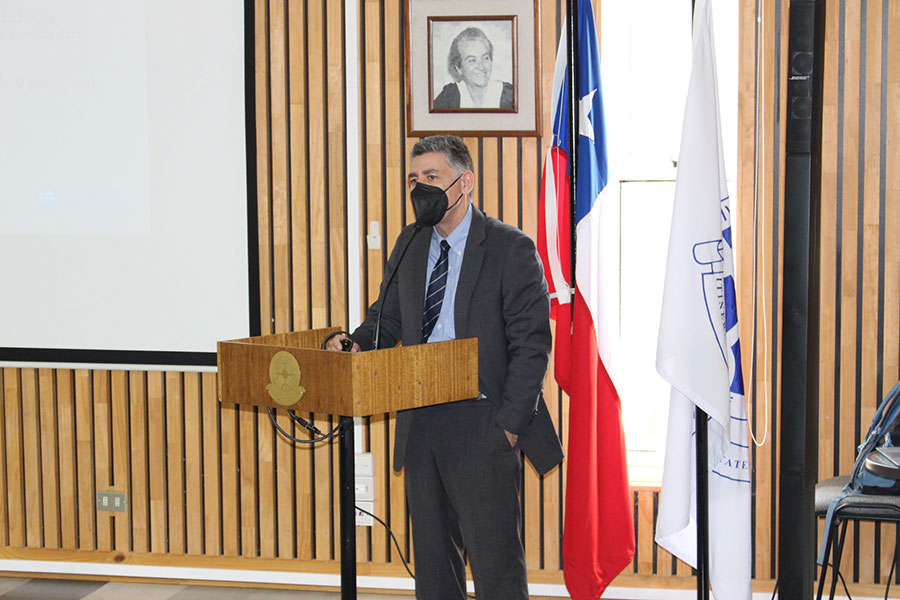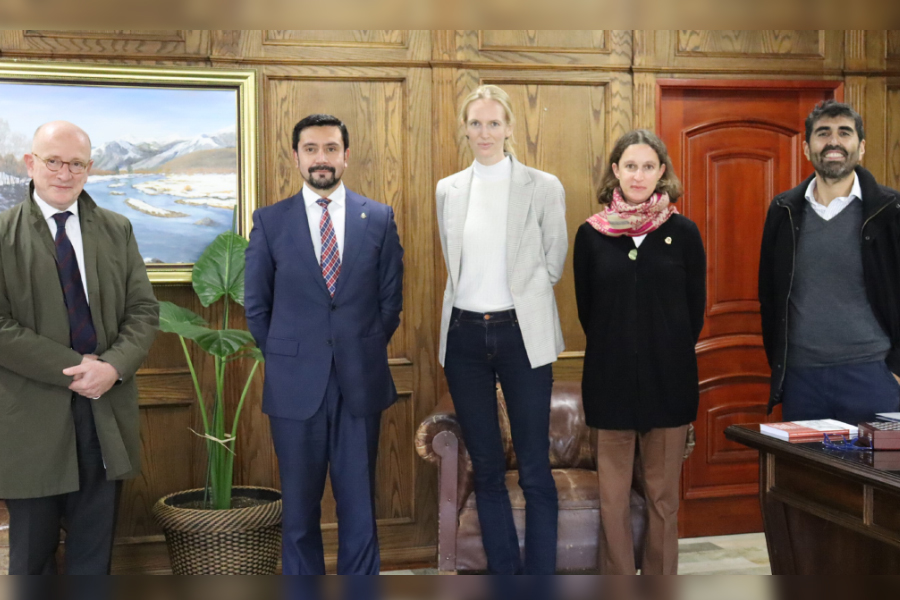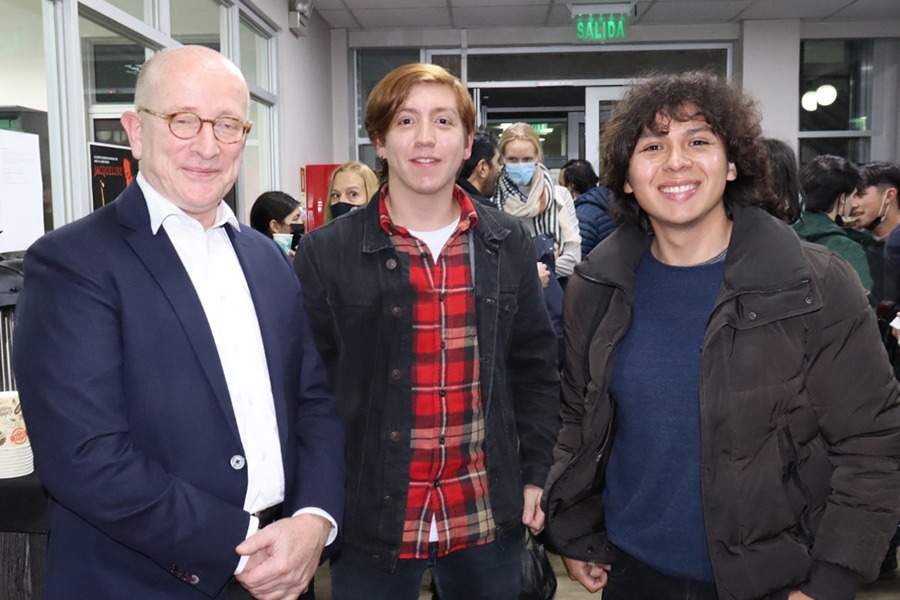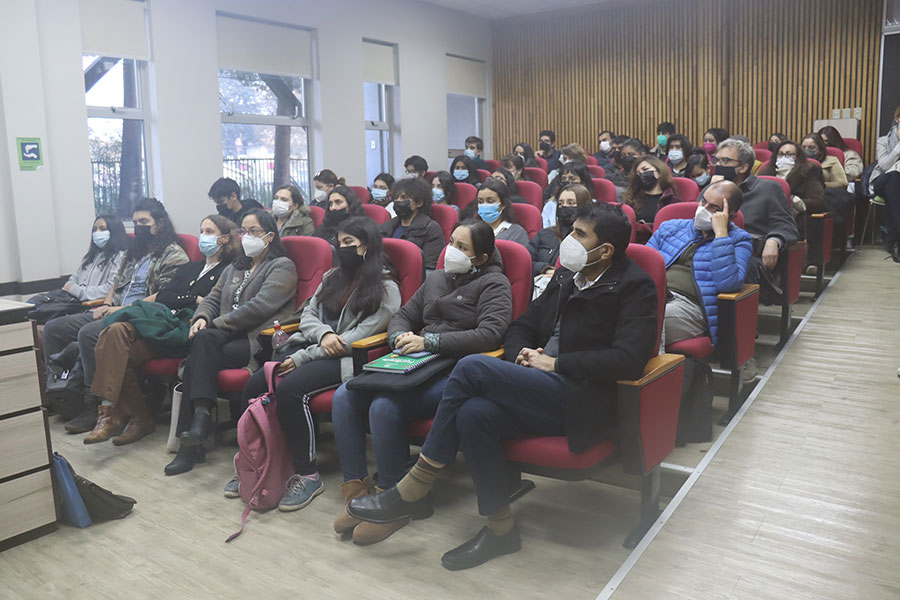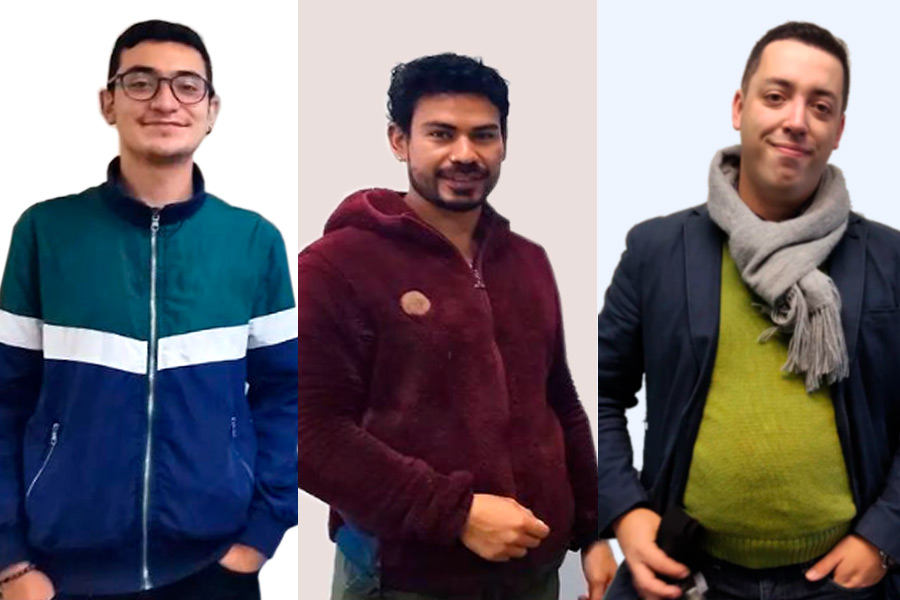|
The candidates Dr. Millaray Curilem and Dr. Eduardo Hebel marked the election process, with Dr. Eduardo Hebel Weiss as the winner who will continue to lead the university during the next four years. |
After an enriching process, characterized by dialogues, proposals and the debate of ideas, Dr. Eduardo Hebel Weiss was reelected as the Rector of the Universidad de La Frontera (UFRO) for the period from 2022 to 2026 with 79.48 % of the votes. The announcement ceremony for this result took place at the Aula Magna of the university, on Friday, June 3, with an atmosphere of high expectations on the sides of each candidate, their election teams and supporters. According to the report of the University Elections Board in Chile (TRICELA), Dr. Eduardo Hebel Weiss got 79.48 % out of 1,691 validly cast votes, winning over Dr. Millaray Curilem Saldías, who got 20.52 % of the votes. “Our team is very happy about this result. We have been working very hard on a project that describes the Universidad de La Frontera of the future. I am convinced that the concepts we proposed were the right ones and that they will help the University to make progress in all areas. And the university community believes in our program and our capability to successfully deal with the challenges to come,” said Dr. Eduardo Hebel after the announcement of the results. With this victory, Dr. Hebel will keep leading the university for a period of four years, immediately facing the self-evaluation process for the renewal of institutional accreditation in the year 2024. “There are many challenges to come, starting with the self-evaluation process, the strategic planning towards 2033, our new educational model and the implementation of the new UFRO statutes as far as the Ministry of Education approves our proposal – those are four of the mayor fields we must focus on,” he explained. “Furthermore, we must continue working on issues such as gender equity and diversity, interculturality, inclusion, and involve our region. These elements will require efforts in different areas, as well as different policies, in order to become a reality in our university community and our students,” emphasized the reelected rector. The candidate Dr. Millaray Curilem stated: “I am very grateful for the way this process went and the opportunities we had to talk about our university, which I consider very important. We will always have to review and rethink our directions and challenges, and we have to do that together. The members of our university community are eager to participate and it is important to emphasize this, because it reflects the great strength of our university.” According to the General Secretary of the Universidad de La Frontera, Plinio Durán, one of the improvements in these elections was the increase in the number of people entitled to vote. “The process was carried out precisely according to protocol. A total of 80.24 % (731 out of 911) voted. That is a good participation, which clearly confirms and validates the result. On behalf of the General Secretariat, I would like to thank everyone who participated in this important democratic process, helping our university to keep progressing,” he said. The president of TRICELA, Mónica Ceballos, emphasized the fairness and respect in this process, as well as the participation of the first female candidate. “Both candidates presented very interesting proposals and could guarantee the governance that the University needs. And also the increase in the number of people entitled to vote is a huge step forward, since it makes the process even more democratic,” she stated.
Written and translated by: UFRO Communications Office |
|
The elaboration of the Strategic Development Plan 2030 is a collaborative, participative, open and convening process that concludes with a route map that will guide the present and future steps of the university. |
The Universidad de La Frontera (UFRO) is facing new challenges of transformation in higher education, in accordance with the requirements of the country and the international context. Therefore, the university has put a special focus on the elaboration of its Strategic Development Plan 2030 (PED 2030). It is an opportunity to face the challenges of the present and the future, by defining the strategic guidelines, prioritizations and focus areas regarding the work of the university, to maintain a sustained development over time, including all entities and management levels. To know and understand the main guidelines and methodologies of a process of updating and change is essential for a university community that grows and develops through numerous initiatives that seek to strengthen the institutional organization and functioning, as well as the suitability, competence, outreach and representativeness of the entire university. According to the director of the Institutional Analysis and Development Office (DADI), Fabiola Ramos, the updating process of the PED 2030 started in 2019 with the implementation of the guidelines for institutional management, in accordance with the laws 21.091 on Higher Education and 21.094 on State Universities. “Both laws allowed us to update our statutes and our institutional mission, taking into account the current requirements and challenges. They offered a great opportunity to relate us in a new way with the state university system and ways of financing.” In this context, “we started to do a participative, open, and three-tier institutional diagnosis, which currently is in the phase of consultation, using instruments such as interviews, focus groups (with internal and external actors), in addition to a survey adjusted to the different levels, with the aim of updating and validating this diagnosis that had to be adapted to the new environment”. The efforts to develop corresponding university policies, for example in the fields of people management, gender, sustainability, digital transformation and internationalization strategies, have become important elements in the process. STAGES AND METHODOLOGY At this stage, the PED 2030 allows assessing the challenges defined in the institutional mission and the new criteria of the Chilean Accreditation Commission (CNA) for institutional accreditation, including the areas that are part of the work of a regional public and state university. But also the needs of the territory and the multiple stakeholders are considered, as well as the challenges of a complex university such as UFRO over the following 10 years. “The stages after the elaboration of the PED 2030 are the formulation of guidelines, objectives, indicators, goals and a new balanced scoreboard for the period 2023-2025. Of course, these actions do not only allow, but require the public and three-tier participation and validation,” the director of DADI explains. TRANSVERSAL APPROACHES As a seal of the work with these characteristics, the transversal approaches proposed are those stated in the institutional mission: human development and sustainability, interculturality, gender equity, inclusion, citizenship, ethics, democracy, internationalization and territorial relevance. These approaches are complemented by the new criteria of accreditation established by CNA: institutional management and strategic planning, educational model (training), research, innovation and creation, outreach and quality assurance. This comprehensive analysis and focus allows us to operate effectively with the diverse management resources we have as a university: policies, strengthening plans, the CNA regulations, policies, and so on. From the beginning, the PED 2030 involved a collaborative nature, through established bodies in the university and different channels to participate and access the information. One example is the open consultation among the university community, which plays an important role in the elaboration of an instrument that considers the university identity, gathering the interests and expectations of each of the university community members, taking into account the common mission and the territory with its particularities and challenges. Written by: UFRO Communications Office
|
|
The executive director of the Fulbright Commission in Chile, Antonio Campaña, gave an informative speech at the UFRO Faculty of Law and Business about the existing international student mobility programs with the United States. |
The Fulbright Commission offers numerous programs and scholarships for research, educational, technical and professional exchange between Chile and the United States, for example with the well-known Harvard University or Georgetown University, among others. In order to disseminate these opportunities, the executive director of the Fulbright Commission in Chile, Antonio Campaña, gave an informative speech at the Faculty of Law and Business of the Universidad de La Frontera (UFRO) about the Fulbright Specialist Program and the U.S. Scholar Program. The informative speech addressed the two main areas of work of the Fulbright Commission, which are scholarships for Chilean citizens who want to go to the United States, mainly to obtain academic degrees, and the different programs the Chilean academics can apply to in order to bring visiting professors to Chile. “These programs are extremely important for our Chilean universities, because they allow us to build partnerships with North American academics and to promote mutual research and future publications, and even to think about future double degree programs. They are very important for making progress with the internationalization of the Chilean universities,” Campaña explained. It is worth mentioning that the visit of Linda Sheryl Greene, the dean of the Law School of the University of Michigan (USA), was also organized with the help of this program. “We consider the visit of the dean as very significant, since she is a constitutional expert who is working with the Universidad de La Frontera, especially with the Faculty of Law and Business, regarding issues that are a priority for Chile, such as the Constitutional Convention.” The dean of the Faculty of Law and Business, Dr. Paulina Sanhueza, emphasized the visit of the dean Greene and the opportunities the Fulbright Commission offers for the development of educational mobility and research. “Through her visit, we want to initiate a cooperation with the Fulbright Specialist Program in order to give our academic body the possibility to carry out an exchange with universities in the United States and to strengthen our research,” she commented. Click here for more information about the Fulbright programs and scholarships: https://www.fulbright.cl/
Written by: Karen Campos Reyes |
|
The ambassador of the Federal Republic of Germany to Chile, Dr. Christian Hellbach, gave a talk to professors and students together with Anna Elisabeth Richter, the head of Economic and Scientific Affairs at the German Embassy in Santiago de Chile, in order to promote the mobility and scientific growth between Germany and Chile. |
With the objective of strengthening the ties between the European Union and the Universidad de La Frontera (UFRO), Dr. Christian Hellbach, the ambassador of the Federal Republic of Germany to Chile, and Anna Elisabeth Richter, the head of Economic and Scientific Affairs at the German Embassy in Santiago de Chile, met with Dr. Renato Hunter Alarcón, the deputy rector of UFRO, as well as with students and academics of the university. For Dr. Hunter, the visit of the representatives of the German Embassy in Santiago de Chile is “important progress in terms of collaborations and exchange opportunities for academics and researchers. Through the German Academic Exchange Service (DAAD), which offers stays and internships at various German universities, the students and academics can increase their knowledge and subsequently share this new knowledge with our undergraduate and graduate students. There is no doubt that this is a great opportunity for our university community and the scientific development of our region and our country,” Hunter commented. The ambassador explained at his visit at UFRO: “Temuco is a city I know and the La Araucanía region is very interesting for us. We believe that we should pay much more attention to it, so I came here to talk about the European Union, its values, the challenges we face and the beliefs that connect us with Chile, since we are very close despite the enormous distance between both countries.” At the same time, the ambassador pointed out: “Chile will be a supplier of green hydrogen and its derivatives in the future, so we will need it to decarbonize our energy matrix. We want to promote the cooperation in the field of renewable energy resource development and use, since the fight against climate change is one of our top priorities. Secondly, Chile has huge potential regarding renewable energies, being one of the most developed countries in this region in terms of political strategies and regulatory frameworks, and the one that has been the closest to developing productive projects, among others in the field of green hydrogen and its derivatives. That is also why we want to consolidate our relationship.” According to the ambassador, the European Union and Germany are currently working on an updated association agreement with Chile, which includes different aspects, such as political issues, sustainability, human rights and gender issues. PROTOCOLAR VISIT The director of the International Affairs Office at UFRO, Dr. Lorena Vieli del Río, and the coordinator of the doctoral program in Social Sciences, Johanna Sagner, led the visit of the German authorities that included an informative talk for students and academics, who were able to discuss and debate about the role of the European Union in the current global scenario. Some of the addressed topics were the economy, international cooperation agreements, the war in Ukraine, the reactions to and effects of the pandemic and the boom in sustainable green hydrogen project proposals. “This meeting was based on the ambassador’s interest in visiting the university and presenting information about the European Union. Although the students are very interested in issues related to international mobility, there are few opportunities for them to learn at first hand more about the policies of countries or institutions such as the EU, about what their perspectives are on the major international conflicts and how they relate to Chile. Therefore, this kind of knowledge, insight and analysis is very interesting, because it affects us in many ways and we rarely have access to it. There has always been great interest in Germany to create links with Chile in the fields of science and research. We have many agreements with German universities and many of our scholars obtained their doctoral degree in Germany. That is why it is important to promote the international mobility of our students and academics”, said Dr. Vieli. The visit of the representatives of the German Embassy in our region concluded with a talk about “DAAD scholarships for doctoral programs and research”. The aim of this activity was to promote the mobility between Germany and Chile and was exclusively for students, researchers and teachers of the Universidad de La Frontera. Written by: María Carolina Oyarzún Varas |
|
Francisco Mejías and Eduardo Salas of the Agronomy Program and Gastón Sepúlveda of the Doctorate in Agri-food Sciences and Environment at UFRO will spend a semester at KU Leuven in Belgium, starting in September. |
The Project of Institutional Strengthening of the State Universities is financed by the Chilean Ministry of Education and provides an important international mobility initiative that allows students of the Universidad de La Frontera (UFRO) to spend a semester at KU Leuven in Belgium. “We know how important this experience is for our students’ academic career, as well as for their personal life. This is the beginning of our international mobility program and we hope to be able to add more opportunities to study abroad,” commented Dr. Adison Altamirano, the dean of the Faculty of Agricultural and Forestry Science at UFRO. The internship program includes the basic expenses for a stay in Belgium for one semester, the flight tickets, as well as an English course with a special focus on this international mobility program, organized by the Faculty of Agricultural and Forestry Science. THE STUDENTS Francisco Mejías and Eduardo Salas of the Agronomy Program and Gastón Sepúlveda of the Doctorate in Agri-food Sciences and Environment at UFRO are the first beneficiaries of this internship program, an initiative that will hopefully allow more undergraduate and graduate students to spend a semester abroad in the future. Francisco Mejías studies Agronomy and is very happy about this opportunity, which, according to him, is key in his professional training. “I will be able to learn new techniques before I graduate and I hope that other students of the different programs at my university will also get such a great opportunity to study at a prestigious university such as KU Leuven. I am also very grateful for all the support of my family, friends and tutors who helped me to take this chance and to go to Belgium at the end of the year,” he said. His fellow student, Eduardo Salas, also feels that this experience will be challenging and enriching at the same time. “The possibility to develop myself in a foreign country, socially and academically, is a unique experience that will expand my horizons and which I will benefit from for the rest of my life,” he explained. Gastón Sepúlveda is a student of the Doctorate in Agri-food Sciences and Environment at UFRO. He explained that this benefit will allow him to make important progress with his research. “This opportunity is very important for me, since I will be able to get to know another reality after such a long time with curfews because of the pandemic. That will also give me new impulses regarding my doctoral thesis. And I found a professor at KU Leuven with whom I can expand my knowledge and explore new areas in my field of work,” he added. Written by: Valentina Duarte Sánchez s |





